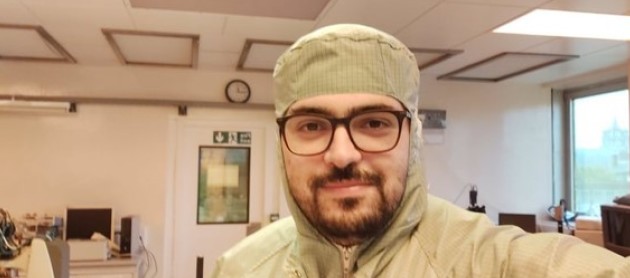
These engineer profiles are part of an earlier project, and some of our staff and students featured may have now left Imperial.
Adam Bouchaala is a postgraduate researcher in our Optical and Semiconductor Devices group.
He is working on the fabrication of nano-scale electronic devices. At this scale, the structures are so small that dust and other airborne particles can easily disturb their fabrication, so you’ll see Adam and his colleagues in our Clean Room on Level 7 wearing protective clothing.
“I discovered nanotechnology when I was doing engineering preparatory school — two years after the high school in the French system. My grandfather was diagnosed with cancer and I found a blog describing how nanorobots could be injected in blood to target cancer cells and destroy them. This was an inspirational moment that helped me to decide my engineering and research paths.”
He describes his field as Mechatronics, an interdisciplinary branch of engineering. “A mechatronics engineer is someone with a multi-disciplinary background who is able to understand a complex system, for example an airplane, car, robot, and to understand how the different parts of the system are connected — mechanical, electrical, and programming.”
Nanotechnology for the future
“Nanotechnology will be everywhere in the next decade. It will be in medicine for single virus detection, it will be in industry in the form of nanosensors and nanoactuators, in defence in the form of highly sensitive sensors for trace explosive detection, and many other things."
Strong research efforts are being focused in the development of miniaturised devices like nanoscale actuators and sensors, to perform complex motions and operations. These technologies are important for future robotics and automation and high performance systems.
“In the aerospace industry you can use nanosensors in structural health monitoring and in electronic navigation devices — for faster signal processing. Nanosensors could be implemented as gas sensors because reducing the size of the sensor will increase the sensitivity.”
“Nanotechnology will be everywhere in the next decade. It will be in medicine for single virus detection, it will be in industry in the form of nanosensors and nanoactuators, in defence in the form of highly sensitive sensors for trace explosive detection, and many other things.”
Adam’s current research aims to make the fabrication, simulation, and inspection of nanoscale devices affordable to the whole world, by developing a new fabrication method that allows parallel fabrication of nanodevices — to scale up the production to fabricate thousands of nanodevices in a single run, which is not possible with the current techniques.
Teaching and learning
If he wasn’t developing his research career, Adam says he would be a musician — he is a professional Oud player.
His plans for the future include “delivering high quality teaching to the next engineers of the world” — and from next January he’ll be a Teaching Fellow in the department.
“Engineering is a way of life, you have to be open minded and good listener to find solutions to the different problems that you will face. I enjoy in teaching the fact that you are in contact with younger people who let you think through their questions. Also, developing new curriculums is something very interesting and enriching.”